The Fourth Nationwide Ceasefire Agreement (NCA) Signing Anniversary, which supposed to be convened on the actual date of October 15, was held on October 28 in Naypyitaw with nine NCA-Signatory-Ethnic Armed Organization (NCA-S-EAO), as the Restoration Council of Shan State (RCSS) delegation was absent.
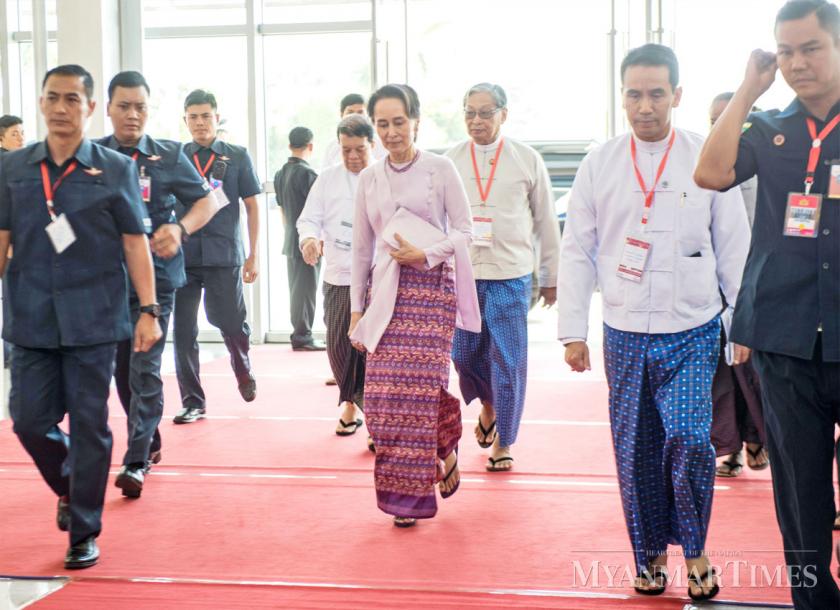
Reportedly, the RCSS issued a three-page statement underlining why it wasn’t able to attend the anniversary occasion.
It was a blow to conveners, especially the government, for the gathering was supposed to uplift the stagnated peace process, which has been halted since over a year, and should have helped paved the way for Joint Implementation Coordination Meeting (JICM), the highest organ in NCA-based peace process, that would outline the negotiation agenda and eventual implementation by the Union Peace Dialogue Joint Committee (UPDJC).
In short, the Tatmadaw blocking of the RCSS leader and his delegation travel using Maehongson – Homong-Langkhur-Nam Zarng-Taunggyi-Naypyitaw to attend the anniversary occasion was the real cause of setback.
Nevertheless, the meeting was held, where State Counselor Aung San Suu Kyi, Commander-in-Chief Min Aung Hlaing and Karen National Union (KNU) Chairman Mutu Say Poe, on behalf of the Peace Process Steering Team (PPST) Chairman General Yawd Serk, delivered the speeches.
But it will be worthwhile to go back a bit on the backdrop of the whole process, which involved the Union Peace Conference (UPC) under Thein Sein’s Union Solidarity and Development Party (USDP) government; the first, second and third 21st Century Panglong – Union Peace Conference (21CP-UPC) under Aung San Suu Kyi-led National League for Democracy (NLD) government.
Background
Following the general election in 2010, under the military-drafted 2008 constitution, on 4 February 2011, Thein Sein became president and formed the first hybrid, quasi-civilian-military government. It is termed hybrid as the military or Tatmadaw is given 25% unelected, appointed MP seats in all level of the parliaments. Furthermore, the military is given the interior, defense and border affairs ministries to administer, according to the constitution.
On 18 August 2011, President Thein Sein made a peace call to end the decades-long armed conflict with the Ethnic Armed Organizations (EAOs). While the initial start-up was aimed at only state-level and union-level ceasefire agreements, it later evolved into NCA configuration.
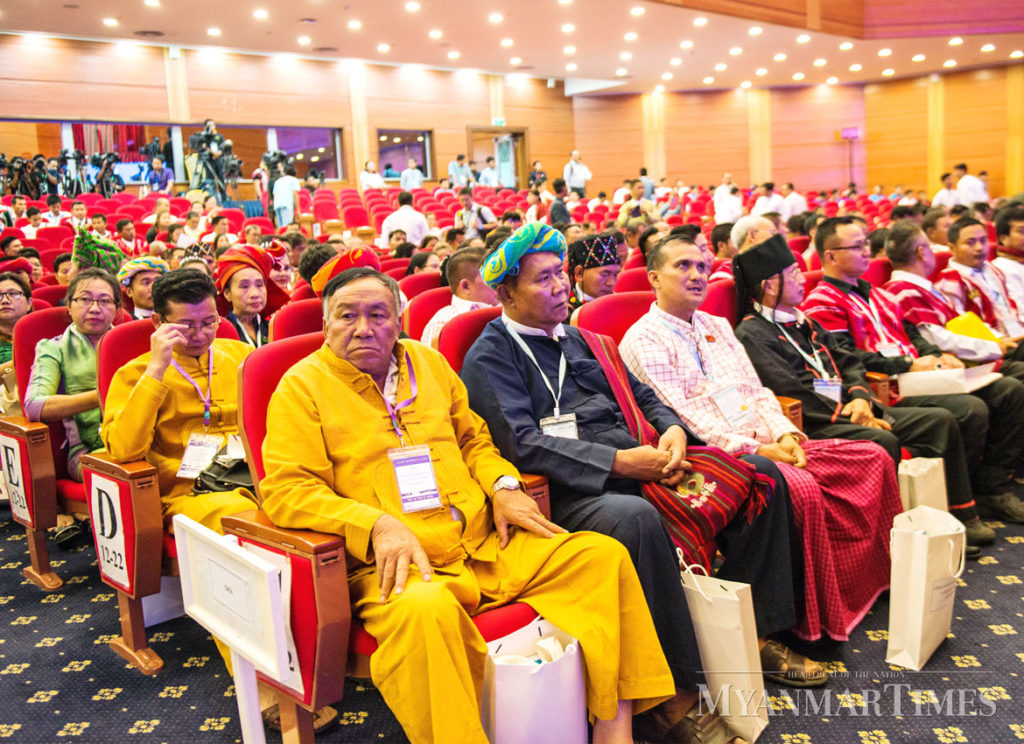
The NCA formulation process started in 2013 under Thein Sein regime, completed after more than two years and was signed on 15 October 2015 between the government and the 8 EAOs, which the parliamentary official endorsement of it on 8 December 2015.
The 8 NCA-S-EAO are: All Burma Students’ Democratic Front (ABSDF), Arakan Liberation Party (ALP), Chin National Front (CNF), Democratic Karen Benevolent Army (DKBA), Karen National Union (KNU), KNU/Karen National Liberation Army Peace Council (KNU/KNLA PC), Pa-O National Liberation Organization (PNLO), and RCSS.
Another 2 EAOs the New Mon State Party and the Lahu Democratic Union, signed the NCA on February 2018, making it 10 altogether.
The first UPC was held on 12-16 January 2016 by Thein Sein government before he made way for the incoming NLD regime. It was just an initial opening of it and it sole intention was to let the peace process move ahead after the regime change and no agreement whatsoever was made.
When the NLD took over the UPC was changed to 21CP-UPC, which is now popularly termed as 21st Century Panglong Conference (21CPC).
The first 21CPC was held from 31 August to 3 September 2016, where 73 proposals and statements were read out by the various EAOs, but no agreement was made. It was a sort of political stand point introduction for a variety of groups.
The second 21CPC able to agree on 37 points; and the third 21CPC held from 11-16 July 2018 agreed on 14 points. The agreement, which is called “Union Accord” and supposed to cover political, security, economy, social, land and environment categories, was able to focus on all areas, except the security issue.
The breakdown of the 51 points agreement are: political 16 points, economy 12 points, social 11 points, land and environment 12 points.
And since the end of the third 21CPC, the planned fourth one has been unable to be convened for various reasons.
According to NCA, the 21CP-UPC should be held twice a year and within four years of NLD tenure, it has only able to convene three times.
Cause of stagnation
The cause of stagnation is due to the dissatisfaction of the KNU and the RCSS and suspension of their participation in the official peace process negotiation.
The KNU on 10 November 2018 made known in its statement that it is withholding its non-participation position in the ongoing peace process in official sense, although it said “trust-building, common vision and shared values” would be worked out among stakeholders through various mechanism and informal discussions, to find answers to the problems.
This decision was the follow up of its letter to State Counselor Aung San Suu Kyi, who is also the chair of the National Reconciliation and Peace Center, on 27 October 2018, which said it was suspending participation in the peace process to find common ground on how to go about with the NCA-based peace process and also giving clarification on the 15-16 October 2018 top leaders’ meeting in Naypyitaw.
The top leaders’ meeting, which included the state counselor and commander-in-chief, instead of becoming a closer meeting forum as expected, worsen the situation even further. During the occasion Min Aung Hlaing lashed out at the RCSS in his opening speech for misusing the NCA for its benefit by recruiting more troops and indulged in territorial expansion.
He further reiterated his demand of what was known as a package deal, which said that the EAOs accepted non-secession demand from the union in exchange for the rights or allowance to draw ethnic state constitution.
Moreover, he also told the audience that the Tatmadaw will not budge from its “single army” stance, which is understood by the EAOs as the maintenance of the Bamar-dominated Tatmadaw as it is.
In the same vein, the RCSS also issued a three-point statement, on 1 November 2018, that it was reconsidering its participation in further Ceasefire Joint Monitoring Committee (JMC) meetings, as it is not satisfied with the unfair and unjustified practical implementation of the procedure. The RCSS has not participated in the JMC meeting since the statement was made public.
As such, the official UPDJC and JMC meetings, which are highest political and ceasefire monitoring implementation organs respectively in NCA-based peace process, have been suspended and this in turn halted the whole official ongoing but stagnated peace process.
While the peace process debacle might primarily be the military demand of “non-secession” and “single army” issues, other disappointments also played important roles in the trust-building deficit.
Earlier, it was criticized that during the third 21CPC, Min Aung Hlaing’s speech seemed like gathering the EAOs and collectively scolding them.
He harshly said: “We wanted to remind you that we’re not lack of strength (for going along with the peace negotiation). If those organizations who really want peace adhere to the agreement, no gun shot will be heard.”
Apart from that the Shan public consultation or political dialogue meetings were prohibited by the Tatmadaw in December 2017, which were earlier supported by the government and even sent in instructions for the local authorities to help in holding them. But it later withdrew the memorandum as the Tatmadaw forcefully began to stop the meetings conducted in Shan State.
The result was the RCSS attended the 21CPC but refused to send in any inputs, as it couldn’t hold the public consultation meetings and get feedback from the locals, which actually are allowed by the NCA.
Again in June 2019, Brig-Gen. Khin Zaw of the Myanmar Embassy in Bangkok objected to the meeting of EAOs in Chiang Mai on grounds that it would be joined not only by the 10 NCA signatories but also by two non-signatories—the Karenni National Progressive Party and the Kachin Independence Army (KIA).
The latest trust-diminishing move as earlier mentioned was the blockage of RCSS delegation led by General Yawd Serk to travel to Naypyitaw to attend the fourth NCA signing ceremony on October 28 by the Tatmadaw, which it argued was the sole responsibility of the RCSS for not communicating on the plan earlier. Besides, Tatmadaw said it would be a security risk to take the land route to travel, as other armed groups against the RCSS are positioned along the way.
Suu Kyi’s speech
During the anniversary occasion Suu Kyi outlined a future three-step peace process to be pursued by the government was reported by The Global New Light of Myanmar as below.
The first was to obtain a framework agreement on implementing NCA. This framework agreement will be the first part of the Union Accord that will be signed at the 21st Century Union Peace Conference fourth session.
This was proposed by the leaders of EAOs that had signed the NCA. We seriously contemplated this proposal. We all accepted the requirement for a process that all agreed on in going forward based on the NCA.
The second was to discuss and negotiate towards getting additional basic principle points in addition to the 51 basic principle points achieved. These basic principle points will be the second part of the Union Accord that will be signed at the 21st Century Union Peace Conference fourth session.
The third was to have a common agreement on stage wise work processes in post 2020 election period and priority programs. If agreements were reached this will be the third part of the Union Accord that will be signed at the 21st Century Union Peace Conference fourth session.
The government’s future peace process second part is participation of all that ought to participate in the peace process. Our government have been increasing the momentum of meeting and discussing with EAOs that hadn’t signed the NCA yet to reach a point where the number of armed conflicts and engagements were reduced. We will strive towards participation of all that ought to participate to come under the umbrella of NCA. Those who didn’t sign the NCA for various reasons were now participating in the discussion. At the moment leaders of the groups that have not signed the NCA are urged to take another step towards participating in the historical political discussion.
Suu Kyi’s closing message said: “Without establishing a federal union based on equality of ethnic people, we wouldn’t see peace in our country. Without establishing an ethnic national unity based on Panglong spirit, our country wouldn’t develop.”
Min Aung Hlaing’s speech
Min Aung Hlaing speech was the reiteration of his three NCA anniversary previous speeches.
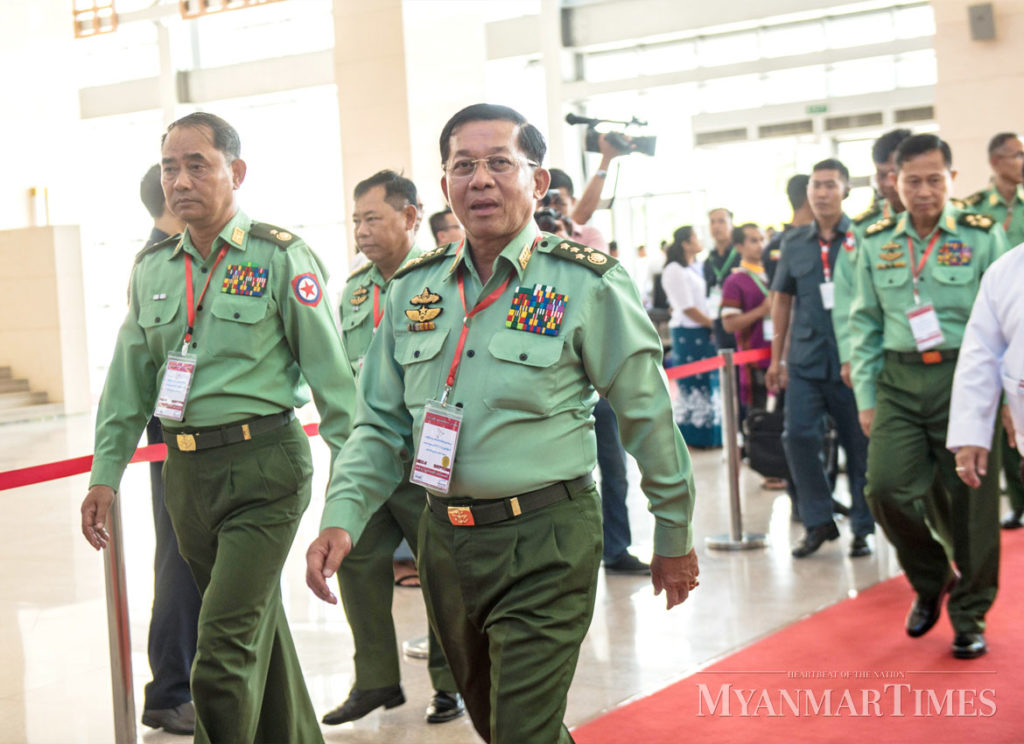
At the first anniversary, he explained the emergence of the NCA and spoke of the need to pay attention to the six peace principles of the Tatmadaw, which are to have a keen desire to reach eternal peace; to keep promises agreed to in peace deals; to avoid capitalizing on the peace agreement; to avoid placing a heavy burden on local people; to strictly abide by the existing laws; and to “march” towards a democratic country in accordance to the 2008 constitution.
The second anniversary explained that the Tatmadaw had paved the way towards multiparty democracy, aspired by the entire people, and the political, economic and social preparations made since the administration of the Tatmadaw government to conveniently proceed on the path, the importance of NCA and the need to sign the NCA.
The third anniversary elaborated on the broadening of the powers by making additions and amendments to the schedule 2 and 5 of the State Constitution (2008) in connection with the importance of the expression “non-secession” in interest of the people and then explained in detail the history of Tatmadaw and the matter of the sole Tatmadaw together with historical backgrounds.
Accordingly, schedule 2 lists the responsibilities of regional and state hluttaws, schedule 3 lists the responsibilities of “leading” bodies of self-administered zones and divisions, and schedule 5 is a list of the taxes entitled to be collected by regions and states.
“I made those clarifications to express the Tatmadaw’s steadfast stand on the NCA, its serious attitude towards peace, non-disintegration of the Union and non-disintegration of national solidarity. The Tatmadaw will firmly continue its peace process, while standing by the NCA,” stressed Min Aung Hlaing in his speech.
He also emphasized that the EAOs were fighting for self-determination and it should be handled as the top priority to achieve peace.
He questioned the actions of the Three Brotherhood Alliance, which includes the Arakan Army (AA), Myanmar National Democratic Alliance Army and Ta’ang National Liberation Army, pointing out the escalation of armed conflict in Arakan State by the AA attacks of four border police stations in Buthitaung Township on 4 January 2019.
He further mentioned that during the Tatmadaw’s unilateral ceasefire nine months period from December 2018 to September 2019, the Three Brotherhood Alliance on 15 August 2019 attacked targets in Pyin Oo Lwin, Nongkhio, Lashio and Kutkai, including blowing up of the bridges.
“Those attacks were inappropriate for our democratization process. Tatmadaw just cannot stand by and do nothing in response to those insurgent attacks,” said Min Aung Hlaing.
Mutu Say Poe’s speech
Since General Yawd Serk, leader of the umbrella organization PPST that represents the 10 NCA-S-EAO, who is also the head of RCSS, cannot attend the anniversary occasion, KNU Chairman General Mutu Say Poe delivered the speech at the anniversary occasion instead.
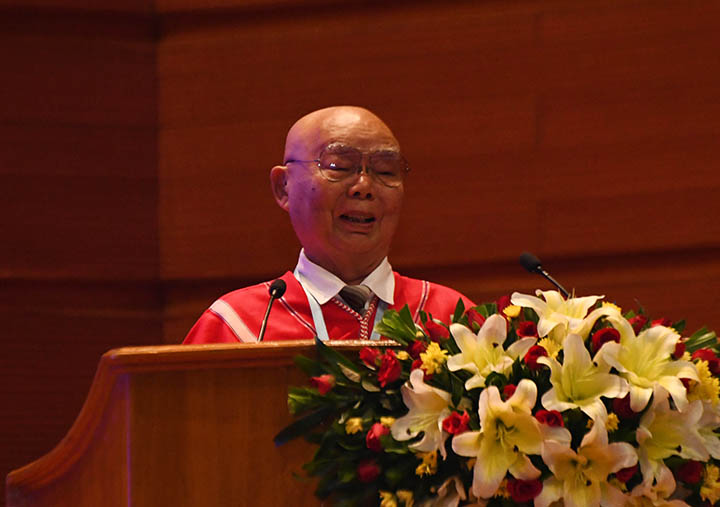
He said in the beginning of his speech: “It is unfortunate that the members of Restoration Council of Shan State (RCSS) missed this anniversary although we were very hopeful about their participation.”
“The government of the Republic of the Union of Myanmar and the ethnic armed organizations signed the NCA four years ago. However, I understand the increasing grudge, doubt, worry and hatred are disturbing the significant development in implementing NCA. We need to review the reason for mistrust, and we need to hold political dialogues based on justice and fairness in implementing peace process,” he earnestly urged.
Reportedly on the sideline, Mutu has met both the state counselor and commander-in-chief to find ways of continuing the peace process, in the wake of unenthusiastic, if not pessimistic, anniversary occasion.
Perspective and outlook
Looking at the unfolding present political situation, one could not help but feel the deteriorating situation of the peace negotiation process.
Suu Kyi’s tone in her speech is compromising and seems to be eager to work with the EAOs, although somewhat disheartened as the much hoped optimism that would come out of the fourth NCA signing anniversary has not come out satisfactorily.
Min Aung Hlaing’s stance is unchanged and this could be translated as going along with the 2008 constitution with some amendment through minimum decentralization and power-sharing in state/region level administration.
It also seems the bilateral ceasefire with the Three Brotherhood Alliance and the KIA won’t be easily achieved and thus all-inclusiveness will still be a distant dream.
The KIA is a member of four-party Northern Alliance-Burma (NA-B), which the Three Brotherhood Alliance is also included.
Mutu is openly disappointed as the 10 NCA-S- EAO has hoped to restart the peace process officially by attending the anniversary, followed by the JICM, UPDJC and JMC meetings that will push for the fourth 21CPC.
He nevertheless has opened up an informal channel with Suu Kyi and as well, Min Aung Hlaing by paying both a visit to salvage the continued peace process stagnation.
Summing up, it is undeniable that the peace process has been pushed back further by Tatmadaw’s blockage of RCSS participation. Thus, it will take some times before the official peace process meetings could restart again and enable the holding of fourth 21st Century Panglong Conference.





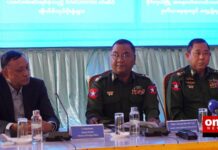





Leave a Comments